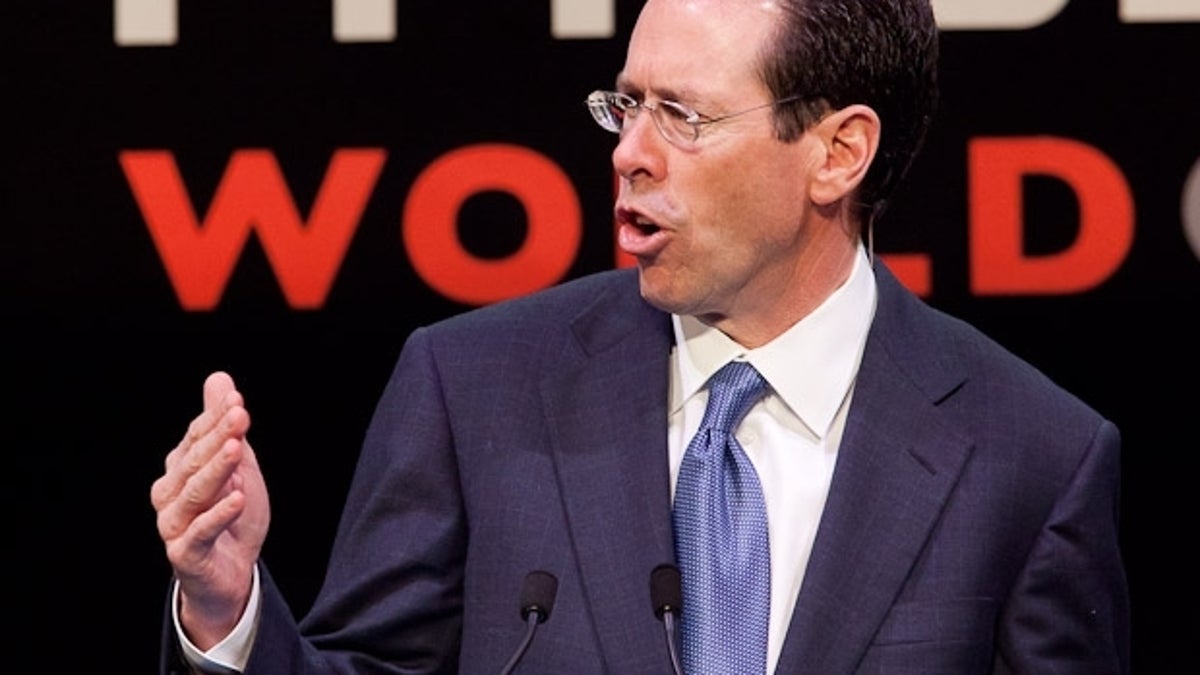AT&T CEO blasts FCC bureaucrats for tanking its T-Mobile deal
CEO Randall Stephenson claims the federal agency is "picking winners and losers" when it comes to which spectrum deals it will greenlight.

Clearly, AT&T CEO Randall Stephenson had some things to get off of his chest.
Stephenson made a rare appearance during the company's quarterly financial conference call today, using part of his time to blast the Federal Communications Commission, which he accused of "picking winners and losers" in how it regulates and approves deals.
"The rules are so fluid, you can drink out of them right now," Stephenson said with a chuckle.
If Stephenson sounds a little bitter, it's a bit understandable. The FCC threw a roadblock in front of its bid to acquire T-Mobile USA, forcing the telecommunications giant to eventually abandon its plans and pay a massive breakup fee to T-Mobile parent Deutsche Telekom. AT&T earlier today reported a fourth-quarter loss of $6.7 billion, partly due to the fee.
Stephenson decried the FCC's shifting standards, noting that the T-Mobile deal used one set of metrics, while AT&T's acquisition of Qualcomm's spectrum--which was approved--followed another set of standards. As a result, AT&T's biggest problem isn't identifying where to acquire spectrum; it's whether it is allowed to pursue a deal.
"Our biggest problem is identifying what the rules are," he said. "It's figuring out how much we're allowed to buy."
The FCC, however, fired back, noting that Stephenson chose to ignore the 150 commercial spectrum-related mobile transactions approved in the past year, including AT&T's own Qualcomm transaction.
"Unfortunately, these facts were completely ignored in the conference call," said FCC spokesman Neil Grace.
To free up spectrum faster, Stephenson called for Congress to pass legislation that would mandate how the FCC would set up its next auction. AT&T wants Congress to dictate how the FCC would run the auction, which would strip away the regulatory body's ability to set conditions on who can bid and how the spectrum can be used. The House of Representatives has drafted such a bill, but the FCC and other telcos have opposed it, saying such a move would give some carriers an unfair advantage.
"As the Chairman has said, our goal and intention for spectrum auctions is that every carrier--big, medium, or small--that needs additional spectrum should have a meaningful chance to bid for it," said Rick Kaplan, chief of the FC wireless telecommunications bureau.
Rural areas of the U.S. may suffer from the failed T-Mobile acquisition, Stephenson said. AT&T said it planned to use the additional spectrum position gleaned from T-Mobile to cover a vast majority of the country. Without the deal, Stephenson said there is no economically feasible way to provide broadband coverage to rural territories.
"To be perfectly candid, we don't have a mobile broadband solution for rural America right now," he said.
A $3.8 billion plan for AT&T to build its LTE network to rural regions was accidentally leaked on the FCC's website by AT&T lawyers a few months ago.
Verizon has announced a $3.6 billion agreement to acquire spectrum from several large cable companies, and Stephenson said he would closely monitor the approval process for that deal. He added, though, that he won't actively participate in any public comments. He said that deal may provide some additional insight into what the FCC is looking for.
"Hopefully, it gives some indication on what this means for us," he said.
Updated at 12:47 p.m. PT: Updated with a response from the FCC.

